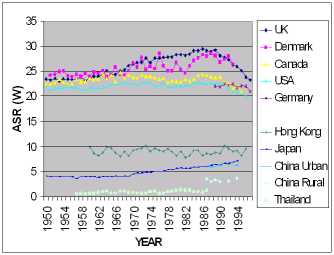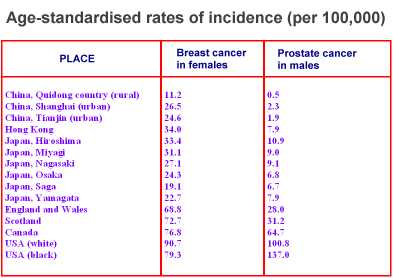 YOUR LIFE IN YOUR HANDS - UNDERSTANDING, PREVENTING AND OVERCOMING BREAST CANCER
YOUR LIFE IN YOUR HANDS - UNDERSTANDING, PREVENTING AND OVERCOMING BREAST CANCER
(The following is adapted from a Powerpoint presentation given by Professor Jane Plant at Windsor in 2004)
Rational explanation of cause and effect for many types of cancer, e.g. Smoking and lung cancer, asbestos and mesotheliona. Also chemicals, viral or bacterial infections.
Some people more likely to be affected because of their genetic makeup, but many cancers related to lifestyle/environmental factors.
Breast cancer incidence in West e.g. eastern US, which includes many ethnic groups, similar to lung cancer incidence among heavy smokers -something causing the disease in high socio-economic groups in rich countries?
Oriental communities traditionally very low breast/prostate cancer rates. When move to the West, rates approach those of host community.
Breast/prostate cancer rates increase when oriental people adopt Western lifestyles: in China slang name - ‘Rich Woman’s Disease’ (they eat meat e.g. pork, chicken, duck (although small quantities), but traditionally no dairy products.
 Consumption of Western food increasing in oriental countries with ‘development’. Westernisation begins in urban centres - significantly higher rates of breast/prostate cancer than rural areas.
Genetic research/molecular protein studies of BC indicate damage to cell, causing wrong chain of protein signals to be relayed causing cancer, between receptors and intercellular fluid.
Only 5 to 10 per cent of BC result of inherited mutated tumour suppresser genes (BRCA-1 and BRCA-2). Disease does not always develop, even if the mutated genes. Suggests cancer risk still reduced if factors signalling to the cell to produce too much, or wrong growth factors removed.
Milk and meat of dead dairy animals contains significant growth factors e.g. IGF-1, and hormones such as prolactin.
Levels of IGF-1 in milk increased due to selective stock breeding and adoption of high-yielding species for dairying.
Use of genetically engineered hormone rBGH to increase milk yield increases IGF-1 levels in milk.
IGF-1 and prolactin promote breast and prostate cancer cell growth in laboratory cultures. Breast tissue has receptors for IGF-1, IGF-11and prolactin.
Casein, main milk protein, protects growth hormones in milk from breaking down during digestion.
Modern milk processing methods (e.g. homogenisation) may further protect chemicals from digestion increasing absorption.
Research on humans shows that pre-menopausal women with high levels of circulating IGF-1 have a higher breast cancer risk, and men with high levels of IGF-1 (8%) are at increased risk of prostate cancer.
Vegans lower levels of IGF-1 (9%) than ovo-lacto vegetarians or omnivores.
Milk is main pathway by which carcinogenic/endocrine disrupting chemicals e.g. dioxins enter body.
Consumption of Western food increasing in oriental countries with ‘development’. Westernisation begins in urban centres - significantly higher rates of breast/prostate cancer than rural areas.
Genetic research/molecular protein studies of BC indicate damage to cell, causing wrong chain of protein signals to be relayed causing cancer, between receptors and intercellular fluid.
Only 5 to 10 per cent of BC result of inherited mutated tumour suppresser genes (BRCA-1 and BRCA-2). Disease does not always develop, even if the mutated genes. Suggests cancer risk still reduced if factors signalling to the cell to produce too much, or wrong growth factors removed.
Milk and meat of dead dairy animals contains significant growth factors e.g. IGF-1, and hormones such as prolactin.
Levels of IGF-1 in milk increased due to selective stock breeding and adoption of high-yielding species for dairying.
Use of genetically engineered hormone rBGH to increase milk yield increases IGF-1 levels in milk.
IGF-1 and prolactin promote breast and prostate cancer cell growth in laboratory cultures. Breast tissue has receptors for IGF-1, IGF-11and prolactin.
Casein, main milk protein, protects growth hormones in milk from breaking down during digestion.
Modern milk processing methods (e.g. homogenisation) may further protect chemicals from digestion increasing absorption.
Research on humans shows that pre-menopausal women with high levels of circulating IGF-1 have a higher breast cancer risk, and men with high levels of IGF-1 (8%) are at increased risk of prostate cancer.
Vegans lower levels of IGF-1 (9%) than ovo-lacto vegetarians or omnivores.
Milk is main pathway by which carcinogenic/endocrine disrupting chemicals e.g. dioxins enter body.
New Evidence from the ICRF Epidemiology Unit,
Oxford University:
IGF-1 is 9% higher in omnivores and dairy consuming vegetarians than vegans (according to Chan, an 8% difference increases prostate cancer risk 7 times).
Routes of Human Exposure to Oestrogens That Have Changed in the Past Half-Century
Royal Society EDCs Report - June 2000
|
Increased consumption of dairy produce
|
Dairy practices have changed so that
pregnant cows (which produce high
levels of oestrogen) continue to be
milked. Significant levels of conjugated
oestrogen are therefore present in
cows’ milk. The extent to which these
are activated in the human gut and
how much oestrogen the consumer is
exposed to is largely unknown.
|
Copyright © 2004-2023 www.cancersupportinternational.com
|
 YOUR LIFE IN YOUR HANDS - UNDERSTANDING, PREVENTING AND OVERCOMING BREAST CANCER
YOUR LIFE IN YOUR HANDS - UNDERSTANDING, PREVENTING AND OVERCOMING BREAST CANCER
